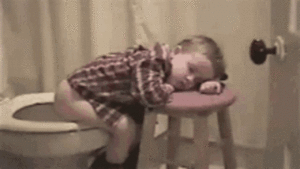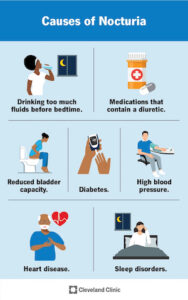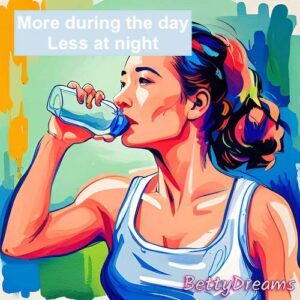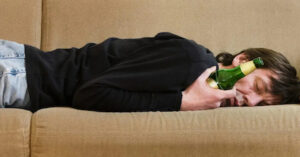Decrease Nighttime Urination with these 5 Tips
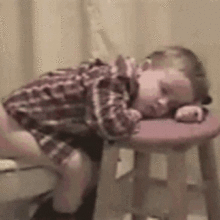
You can decrease nighttime urination by using one or more of five tips I’m about to reveal. Stop disrupting your sleep with annoying trips to the bathroom when you’re trying to sleep.
⦿ Circadian rhythms play a key role in influencing kidney function, so drink most liquids during the day to help decrease nighttime urination. ⦿ The rate of fluid ingestion is also material -- drink slower at night, as well as less. ⦿ Alcohol and caffeine at night -- a no no for restful sleep. ⦿ Knee-high stockings might help.
To decrease nighttime urination — those sleep-depriving trips to the bathroom that disrupt your sleep — it’s essential to understand the connection between your body’s circadian rhythms and its urinary functions.
I’m mainly focusing on Nocturia. Nocturia is waking up more than once during the night because you have to pee. The reasons for this can include sleep disorders, bladder obstruction, diabetes and other ailments, says the Cleveland Clinic, but the focus in this post is about how to decrease nighttime urination (nocturia) due to:
- drinking too much of the wrong stuff,
- too quickly,
- at the wrong time.
This post was inspired by a 5:23 minute snippet about nocturia and how to decrease nighttime urination presented by the ubiquitous Stanford neuroscientist, Dr. Andrew Huberman.
You can view his video below, after which I’ll review it and give you the five tips to decrease nighttime urination (nocturia) — three from Huberman and one from urologist Dr. Edward Schaeffer, and one from me based on a dash of common sense, a heap of personal experience and some research.
More info: ircadian rhythms and the kidney (Nature Review Nephrology)
Full Huberman episode: How to Optimize Your Water Quality & Intake for Health.
The Connection between Circadian Rhythms and Fluid Consumption
If you watched the video, I think you’ll find that this write-up about the points Huberman makes succinctly defines the connection between circadian rhythms and fluid consumption.
During the first 10 hours of your day after waking, you should aim to consume around 8 ounces or 240 milliliters of fluid per hour. Why this specific timeframe? It’s all about your body’s internal clock, or circadian rhythms, which regulate various bodily functions, including kidney activity and urine production.
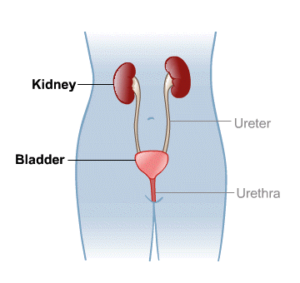 The kidneys play a crucial role in filtering fluids in your body. They use hormones like vasopressin (antidiuretic hormone) to adjust the balance between retaining and releasing fluids in the form of urine. These kidney functions are strongly influenced by circadian clock genes present in various cells throughout your body.
The kidneys play a crucial role in filtering fluids in your body. They use hormones like vasopressin (antidiuretic hormone) to adjust the balance between retaining and releasing fluids in the form of urine. These kidney functions are strongly influenced by circadian clock genes present in various cells throughout your body.
For those initial 10 hours after you wake up, your kidneys work efficiently to filter fluids, ensuring that your body stays well-hydrated and balanced. However, as the day progresses, around the 10-hour mark after waking up, your kidney function starts to decrease. This doesn’t mean your kidneys stop working entirely, but they become less efficient, preventing you from needing to urinate as frequently, especially during the night.
So, how can you reduce those midnight bathroom trips? Five tips await your eager eyes.
Decrease Nighttime Urination with these Five Tips
Here they are:
- Stay hydrated throughout the day, but
- Drink less at night,
- Minimize alcohol and eliminate caffeine at night,
- Drink slower at night, and maybe
- Wear knee-high stockings.
Numbers one and two seem like common sense, but number four was an eye-opener for me.
Tip #1: Stay hydrated during the day
To limit nighttime awakenings to use the restroom, make sure you maintain adequate hydration during the daytime. This will help prevent excessive thirst in the evening, reducing the need to consume large amounts of fluid before bedtime.
Tip #2: Drink less at night
If you’re prone to waking up at night to urinate, reduce your fluid intake in the later part of the day, especially after the first 10 hours of waking.
Provided you’ve stayed adequately hydrated throughout the day, aim to consume no more than 5 to 8 ounces of fluid between that 10-hour mark after waking up and bedtime. If you’re very thirsty or dehydrated, it’s okay to drink a bit more, but most people will find that sipping small amounts of fluids, as opposed to gulping them, will help minimize nighttime bathroom trips.
Personally, I recently have often been dragging my butt out of bed once or twice during the night to make a groggy, stumbling journey to the commode. Thankfully, I don’t think it’s an age thing; rather, it’s due, I think, to a new habit of mine that helps me adhere to a time-restricted feeding window that begins at 11:00 am and ends at 7:00 pm (usually).
Since I typically retire at 11:00 PM, I’m without food for four hours (7 till 11 pm). By 10:00 I’m getting munchy. What I found tamps down the munchies is two tablespoons of apple cider vinegar and 12 ounces of either purified water or carbonated water (which by the way may reduce after dinner blood sugar spikes, and is a healthy “food” for the gut microbiome).
This is a healthy habit, but it may be interfering with my sleep.
What to do?
Tip #3: Drink slower at night
Interestingly, it’s not just the volume of fluid you consume but also the rate at which you drink that affects how quickly it moves through your body. Gulping down fluids will lead to faster excretion than sipping them slowly. During the day, feel free to drink at the pace that suits you, whether you’re a gulper or a sipper. However, in the evening, opt for sipping your beverages, and keep the total fluid intake in check to reduce nighttime disturbances.
In my case, I’ve been drinking my apple cider vinegar drink earlier in the evening, within an hour of dinner, I’ve reduced the amount of water to 8 ounces, and I’m sipping it for about an hour (till 9:00), with no additional liquids thereafter. So far, so good.
Tip #4: Minimize the alcohol and eliminate the caffeine at night
Drinking alcohol and consuming caffeine at night can have significant consequences for both sleep quality and nocturia, which remember, is the need to wake up and urinate during the night.
The effects of alcohol on sleep are multi-faceted. While alcohol is initially a central nervous system depressant that can induce feelings of relaxation and sleepiness, it’s associated with poor sleep quality and duration. For instance, consuming alcohol before bedtime can lead to the suppression of REM (rapid eye movement) sleep during the initial sleep cycles.
REM sleep is important for strengthening and maintaining synapses in the brain, which is thought to be important for mood, learning, and memory formation [1], and helps to ensure better mental concentration and mood regulation, two things that are critical to both your daily work performance and overall quality of life. Without REM sleep, your immune system could be weakened, you may experience pain more deeply, and the growth of new healthy cells and tissue in the body might be blocked [2].
Although it may help with sleep onset due to its sedative properties, it often results in sleep disruptions later in the sleep cycle as the body metabolizes alcohol. This can lead to daytime sleepiness and other related issues the following day.
Consuming caffeine at night can also have negative effects on both sleep quality and nocturia. Caffeine is a stimulant that can interfere with sleep quality and quantity. It can increase sleep latency, shorten total sleep duration, and reduce sleep efficiency [3].
The effects of caffeine on sleep depend not only on the amount of caffeine ingested at bedtime but also on the amount of caffeine ingested over the whole day. A study of young and middle-aged adults concluded that caffeine increased sleep latency, shortened total sleep duration, and reduced sleep efficiency; unsurprisingly, especially when consumed near bed time. In addition, caffeine intake may exaggerate sleep problems by disturbing sleep and circadian timing [4].
Tip #5 Wearing knee-high stockings might help
Urologist Dr. Edward Schaeffer says that peripheral edema — or retention of fluid in the legs — can affect how much you are urinating. Even if it’s subtle, this is one of the main drivers of frequent nighttime urination, he says.
What can happen is that at night when you’re lying down, this fluid in the legs can leave and enter the vascular space (the space contained within blood vessels), which your kidneys can read as “increased fluid.”
One way to know if you retain fluid in your lower legs is to observe if your socks leave an indention in their skin. If that’s the case, you might be a candidate for wearing knee-high stockings in bed. Dr. Schaeffer says that “if I see [patients] at 8, 9, 10 o’clock in the morning and they have any edema, any kind of ringing around their socks, then I definitely strongly encourage them to do that” [5].
So, to sum up, experiment with these five tips to decrease nighttime urination. By all means get plenty of hydration — especially if you exercise — but try front loading most of your fluid consumption prior to the evening so that you can improve your chances of having a peaceful night’s sleep without frequent trips to the bathroom.
Amen to that.
Last Updated on February 7, 2024 by Joe Garma

